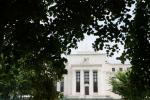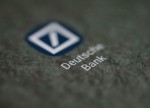
- All Instrument Types
- Indices
- Equities
- ETFs
- Funds
- Commodities
- Currencies
- Crypto
- Bonds
- Certificates
Please try another search

The US Dollar is one of the least loved currencies so far this year. It has only managed to make gains against two of its G10 peers, the USD/CAD and the USD/SEK, even though some were calling for a bull run in 2014.
Frustration with the dollar’s seemingly inability to rally could also be simmering at the ECB. While some have said that China and Russia’s commitment to end currency intervention in the coming years means that currency wars are coming to an end, the mother of all battles could be about to start.
For the past month we have seen an escalation in rhetoric from ECB members who have sounded concerned about the strength of the EUR and the impact this is having on inflation in the currency bloc, which is currently a mere 0.5%. When EUR/USD hit 1.3967 on 13th March ECB members including Mario Draghi spoke out against EUR strength.
Although the ECB President said that the currency was not a policy tool, he did say that it could threaten price stability in the currency bloc, which could justify further policy measures.
On the other side of the Atlantic, the new Fed Governor Janet Yellen is doing nothing to help the ECB’s cause. Prices have been rising in the US and core inflation is now at 1.7%, the highest level of the year so far.
However, in a speech in New York on Wednesday Janet Yellen said this wasn’t enough. She is concerned that the labour market will not be strong enough to boost prices above the Fed’s preferred level of 2%, which supports an accommodative stance of monetary policy for the long-term.
The ECB’s perspective:
• A weaker EUR is fairly difficult for the ECB to manipulate. Apart from rhetoric from its members, implementing currency-negative policies such as QE or negative interest rates are fraught with difficulties for a 17 nation currency bloc.
For example, QE is technically easy to implement but could be politically fractious. Meanwhile, negative deposit rates could hurt Europe’s fragile banking system as it embarks on the long road to recovery.
• The dollar has declined nearly 6% on a broad-based basis since peaking in July last year, even though the Fed has started tapering its QE programme.
• If the Federal Reserve could address the prospect of life after tapering (i.e., rate hikes) more directly then this could trigger a dollar rally, and a (much-needed) EUR decline, which could ease the pressure on the ECB to take more radical policy steps.
The Fed’s perspective:
• Although Yellen noted that the recent economic weakness could be weather related, the March data that has been released so far has been fairly mediocre and doesn’t suggest that the US economy is springing back to life.
• The Fed governor said that the economy needs “extraordinary support for some time,” due to a weak jobs market and low inflation.
• Yellen and co. at the Fed need to do what is best for the US economy, not what is best for the ECB, although Yellen did say that the Fed was mindful of the consequences of withdrawing its support on the global financial markets.
Traditionally we have associated currency wars with the Emerging world, however in this instance the Eurozone is at odds with emerging markets. The former are concerned that a fast withdrawal of US monetary stimulus could lead to capital outflows and currency weakness, while the latter may prefer if the Fed started to sound a bit more optimistic, which could trigger some USD strength.
The stealth currency war
Overall, an ECB vs. Fed currency war, if it happens, is likely to be cloak and dagger affair. From a diplomatic perspective the two largest central banks in the world can’t be seen to be at each-others’ throats, so don’t expect any explicit Fed bashing from the ECB.
The Fed could spur the ECB to action
However, if EUR/USD continues to hover around 1.40 and the Fed sticks to its current message then the ECB may have to unleash the big guns in the form of negative deposit rates, or QE, to weaken the EUR once and for all.
Ultimately, it could be the Fed, rather than weak inflation, that may force the ECB to embark on radical policy measures in the near term.

Source: Forex.com and Bloomberg





